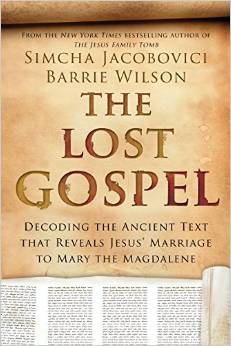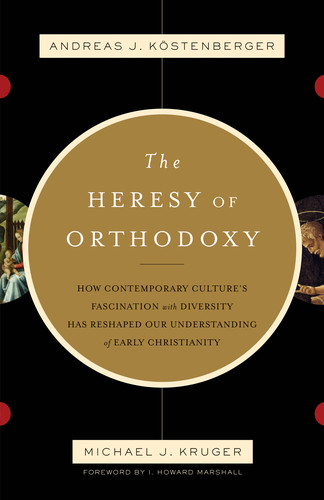Tony Burke’s blog Apocryphicity is a first rate blog for anyone interested in critical studies of early Christianity and its literature. Coincidentally the blog has been running as long as Vridar (since November 2006) yet I only discovered its treasures a day or two ago.
Here’s what I have gained from reading it in just that short time.
Tony Burke played a significant role in the translation of The Story of Joseph and Aneseth so central to the popular controversial publication this year of The Lost Gospel: Decoding the Ancient Text that Reveals Jesus’ Marriage to Mary the Magdalene (Harper Collins, 2014) by Simcha Jacobovici and Barrie Wilson.
 He explains his role, the reasons he undertook the task and his experience of peer pressure to refrain in Translating Joseph and Aseneth: My role in Jacobivici and Wilson’s “Lost Gospel”. I found this paragraph quite a refreshing read at a number of levels:
He explains his role, the reasons he undertook the task and his experience of peer pressure to refrain in Translating Joseph and Aseneth: My role in Jacobivici and Wilson’s “Lost Gospel”. I found this paragraph quite a refreshing read at a number of levels:
Throughout the process Barrie and Simcha warned me that I might be criticized for working with them on the book; other scholars have shied away from participating on Simcha’s projects out of fear of damage to their careers, others because they worry that their views will be misrepresented, as often happens in documentaries. I think Barrie and Simcha’s decision not to tell me about their argument was motivated, at least in part, by a desire to prevent my scholarly reputation from being damaged.
I am not one to shy away from controversy and believe that no argument—even if it is highly speculative, even if it is presented outside of scholarly circles—should be silenced. It has been frustrating to see other scholars and the media dismiss the book without having read it or fully engaged with its arguments. I don’t expect Barrie and Simcha’s position on Joseph and Aseneth to convince many on the origins of this text, but there are aspects of their work that are of interest for the study of Syrian Christianity. (my bolding and formatting as in all quotes)
Why do so many scholars seem to think that rubbishy and ignorant dismissals of ideas they find offensive will teach and inform anybody? Why do so many public intellectuals treat the public with contempt?
Tony Burke sounds like someone you can talk to, who will defend his views and who will give you something substantial and valid to think about that may lead you to revise your own thoughts.
The Gospel of Thomas
John Dominic Crossan brought this work to a wider public awareness when he argued the evidence we should consider it one of the earliest sources for the sayings of Jesus — even dating its contents earlier than our canonical gospels. Subsequently I read a handful of works on this text but after Nicholas Perrin’s Thomas and Tatian : the relationship between the Gospel of Thomas and the Diatessaron I carelessly thought, like a true amateur, that the debate would be over and the gospel would be assigned a provenance of the late second century. Tony Burke’s blog exposed me to additional important reading and especially to criticisms of Perrin’s arguments. Next on my list is Christopher Skinner’s What Are They Saying About the Gospel of Thomas?
The beautiful thing about Tony’s review is that I was able to follow links to additional reading on other sites, including some responses to criticisms by Perrin himself.
Another “next on my list” to read is not directly related to the Gospel of Thomas but to the basis of what we think we know about the Diatessaron — supposedly the earliest harmony of the gospels composed by Tatian in the latter half of the second century — In Search of Tatian’s Diatessaron in the West by Ulrich Schmid.
Weekly Reflections on New Testament Apocrypha Courses
It turns out these posts are not simply gossipy thoughts on student interactions etc but are fascinating insights into the mind of an academic seeking ways to make certain information more meaningful and this means more valuable gems for serious readers in the same topics.
 Example: In his Week 11 post Tony discusses the book he set for his students’ book review assignment, Kruger and Köstenberger’s The Heresy of Orthodoxy. The book is a criticism of Bauer’s thesis that I have long assumed is anathema in the wider scholarly community today but Tony Burke tells us he would be considered a “member” of “Bauer’s school”. (Bauer believed Christian “heresies” — later so-called — preceded “orthodoxy” in many regions.)
Example: In his Week 11 post Tony discusses the book he set for his students’ book review assignment, Kruger and Köstenberger’s The Heresy of Orthodoxy. The book is a criticism of Bauer’s thesis that I have long assumed is anathema in the wider scholarly community today but Tony Burke tells us he would be considered a “member” of “Bauer’s school”. (Bauer believed Christian “heresies” — later so-called — preceded “orthodoxy” in many regions.)
I wanted the students to recognize that The Heresy of Orthodoxy is a transparently apologetic work (indeed, they admit as much when they say “It is our sincere hope that this volume will make a small contribution toward a defense of the ‘faith once for all delivered to the saints’ in our generation,” p. 19).
Though the book looks very scholarly—with copious notes demonstrating a command of both primary and secondary literature—it is really a work of theology that does not engage Bauer and his supporters using the same historical-critical methodology. For example, where most scholars discuss the human efforts and motives for the construction of the canon, K&K appeal to supernatural forces: “The function of the apostolate was to make sure that the message of Christ was firmly and accurately preserved for future generations, through the help of the Holy Spirit, whether written by its members directly or through a close follower of theirs” (117); and, “Theologians have historically affirmed that the critical link between the covenant books and the covenant community is the work of the Holy Spirit” (122). Furthermore, they see the relativism in scholarship of early Christianity as “driven by forces that seek to discredit the biblical message about Jesus, the Lord and Messiah and Son of God, and the absolute truth claims of Christianity” (18).
In our discussion, I did praise K&K and their peers for correcting some of the more speculative claims of liberal scholarship but emphasized that they are really only preaching to the converted—that is, the only people (besides us) reading the book don’t really need convincing.
Burke has more detailed reviews of the same work in a series of other posts beginning here. Some extracts to give you the critical flavour:
First, a basic description of the book. Like previous works of this kind, it is published by a press known for fairly conservative (or simply theological) books: Crossway. The testimonials filling the opening pages are all by conservative writers, several of whom have written books very much like this one (e.g., Darrell Bock, Dan Wallace). The forward by Howard I. Marshall seems to anticipate any criticisms of the authors’ theological perspective: “The authors write as adherents of what would probably be identified as an evangelical Christianity that maintains a belief in the divine inspiration of Scripture, but, so far as I can see, their arguments are not dependent on this belief and rest on solid evidence and reasonable arguments” (12). He couldn’t be more wrong.
K&K describe the purposes behind their work in language of alarm. They are concerned that the modern attraction to diversity is interfering with the determination of what is truth…..
The next extract I find of particular interest because it mirrors the very approach of several supposedly “critical” scholars today in their disputes with Richard Carrier:
What I find objectionable about K&K’s arguments is that they seek to discredit the Bauer thesis by dismantling only minor points that, at times, even Bauer is cautious about or are tertiary to his principal argument (e.g., that Marcionism was the earliest form of Christianity in Edessa, that the Epistle of Barnabas is Gnostic). For my part, I am not certain that heresy preceded orthodoxy in even Edessa and Alexandria, but the evidence does indicate considerable diversity in those areas and that orthodoxy was not solidified there for some time. I am more inclined to envision early Christianity as represented in a broad spectrum of beliefs (about Jesus, about proper practice, etc.) that led to the forms we find in the second century and beyond. Whether any of these forms of Christianity is the “true” one is a theological, not a historical, argument.
Tony Burke also links to other detailed reviews of the same work.
I will be taken special notice whenever I see something new posted on Apocryphicity. Some of my spare moments will no doubt be occupied reviewing some of his earlier articles.
Neil Godfrey
Latest posts by Neil Godfrey (see all)
- What Others have Written About Galatians (and Christian Origins) – Rudolf Steck - 2024-07-24 09:24:46 GMT+0000
- What Others have Written About Galatians – Alfred Loisy - 2024-07-17 22:13:19 GMT+0000
- What Others have Written About Galatians – Pierson and Naber - 2024-07-09 05:08:40 GMT+0000
If you enjoyed this post, please consider donating to Vridar. Thanks!


I’ve only read Goodacre’s book on GThomas, but I think he makes a pretty solid case for the author knowing the synoptics in some form.
I first heard of Jacobivici with his horrible “Exodus Decoded” special, and appreciated the work of Chris Heard at Haggion (http://drchris.me/higgaion/?p=463) taking it (and Simcha) to task over it. That is a better approach then just dismissing them out of hand. I’m not sure that releasing highly… speculative work in the manner that he (Jacobivici) did with that (and others, I think he was involved with the James Ossuary as well) is the way to go about it either.
in either case, his blog looks interesting.
Scientists take the trouble to answer the genuine questions and arguments of Creationists. Not because they know they will change the minds of everyone but because they know the facts support evolution and by arguing the case clearly they can persuade more people over time.
It does not hurt to take the time to address ideas we might at first think crazy. The effort will at least help us clarify our own knowledge and how we know what we know — and perhaps help us even respect those we want to dismiss as coming from another planet. One effort of mine that I posted on this blog is re the myth of Atlantis: http://vridar.org/2007/01/12/atlantis-another-21st-century-myth/ I don’t accept Joe Atwill’s methods or conclusions but I deplore those who scoff at him personally: http://vridar.org/2013/10/12/so-this-was-kick-joe-atwill-week/
Scoffing at Atwill is somewhat understandable on multiple levels.
What I don’t get is the kind of vitriol that was aimed at the likes of Thomas L. Thompson and Niels Peter Lemche awhile ago. They have the scholarly credentials, and their historical-critical method is extremely strict due to their conservative reading of Popper’s concept of falsifiability. They never go out on a limb in a public forum.